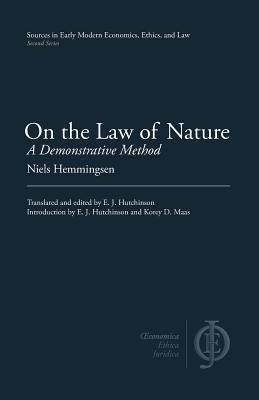On the Law of Nature is at once a traditional and eclectic treatise of moral philosophy by one of the sixteenth century's most widely read Protestant authors. Niels Hemmingsen (1513-1600), the "Teacher of Denmark," was a Danish humanist and theologian who studied with the "Teacher of Germany," Philip Melanchthon, at the University of Wittenberg. Hemmingsen went on to serve as a professor at the University of Copenhagen--first of Greek, then of dialectic, and finally of theology. He wrote voluminously on method, theology, exegesis, homiletics, and ethics.In this treatise Hemmingsen argues that all particular rules of ethical conduct can be derived from immutable axioms or first principles. Though moral philosophy works according to its own rules, Hemmingsen shows that its conclusions, far from being at odds with the divine revelation of the moral law, are identical with the ethical commandments of Scripture. Thus Hemmingsen includes a section on the Decalogue, along with a lengthy account of the traditional cardinal virtues, supported by a myriad of quotations from classical Greek and Roman sources. This important treatise looks both backward to classical and medieval philosophy and forward to developments in the seventeenth century and beyond.

On the Law of Nature is at once a traditional and eclectic treatise of moral philosophy by one of the sixteenth century's most widely read Protestant authors. Niels Hemmingsen (1513-1600), the "Teacher of Denmark," was a Danish humanist and theologian who studied with the "Teacher of Germany," Philip Melanchthon, at the University of Wittenberg. Hemmingsen went on to serve as a professor at the University of Copenhagen--first of Greek, then of dialectic, and finally of theology. He wrote voluminously on method, theology, exegesis, homiletics, and ethics.In this treatise Hemmingsen argues that all particular rules of ethical conduct can be derived from immutable axioms or first principles. Though moral philosophy works according to its own rules, Hemmingsen shows that its conclusions, far from being at odds with the divine revelation of the moral law, are identical with the ethical commandments of Scripture. Thus Hemmingsen includes a section on the Decalogue, along with a lengthy account of the traditional cardinal virtues, supported by a myriad of quotations from classical Greek and Roman sources. This important treatise looks both backward to classical and medieval philosophy and forward to developments in the seventeenth century and beyond.